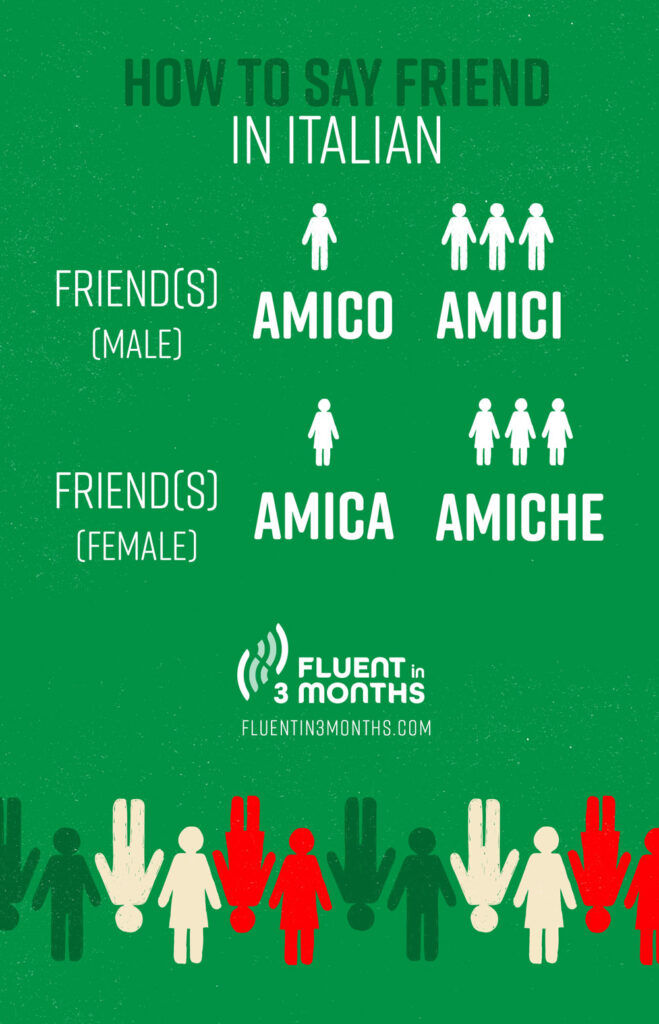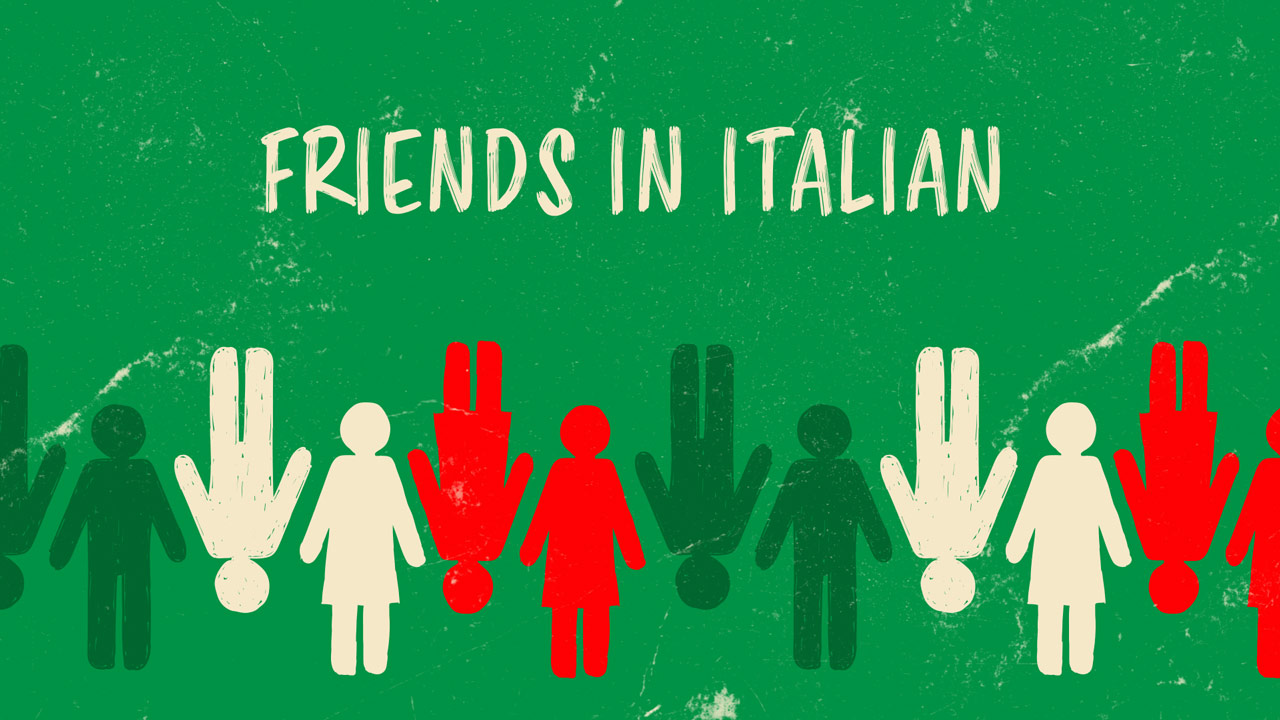How to Say “Friend” In Italian [With Audio Examples]
Friend in Italian is amico for your male friends, and amica for your female friends.
But in plural forms, amico becomes amici, and amica becomes amiche.
That said, friendships in Italian go beyond saying amico or amica — meeting up with friends, making new friends, and giving each other cool nicknames will also be part of your language learning experience with your Italian or Italian-speaking friends.
In this article, we’ll learn how to say friend, use it in different sentences, and cover idiomatic expressions that include the word “friend.”
Table of contents
- Friend in Italian: Vocab List
- Origin of the Italian Word for Friend
- How to Say My Friend in Italian
- How to Say Friends in Italian: Plural Forms
- How to Say My Friends in Italian
- Is Amico Formal or Informal?
- Other Ways to Call Your Friends in Italian
- Example Sentences with Friend in Italian
- Expressions and Useful Phrases with Friend in Italian
- Time to Impress Your Italian Friends
Friend in Italian: Vocab List
Amico means “friend” in Italian, but its feminine singular, masculine plural, and feminine plural forms vary. Here is a handy list, along with their pronunciations:
| English | Italian | Audio |
|---|---|---|
| “Friend” (male) | Amico | |
| “Friend” (female) | Amica | |
| “Friends” (plural – group of male friends or group of male and female friends) | Amici | |
| “Friends” (plural – group of female friends) | Amiche |

Origin of the Italian Word for Friend
The Latin word amicus made its way into many Romance languages: Italian, French, Spanish, and Portuguese all use some form of amicus, be it amico, ami, or amigo.
In Italian, “friend” is amico (male) or amica (female). When pronouncing these words, put the stress on the second-to-last syllable: a-MI-co and a-MI-ca.
How to Say My Friend in Italian
To say “my friend” in Italian, you need possessive adjectives that mean “my” — il mio for masculine, and la mia for feminine nouns.
So “my friend” would be il mio amico if you’re referring to a male friend, and la mia amica if you’re talking about a female friend.
How to Say Friends in Italian: Plural Forms
In Italian plural form, amico becomes amici, and amica becomes amiche. Plurals for masculine words and feminine words are not the same in Italian.
An important note: amici is used in two cases: while referring to a group of male friends, as well as referring to a group of a mixed group of male and female friends. Take a look at these two sentences, talking about different friends.
- I miei amici, Sara e Rafael, sono venuti a trovarmi. “My friends, Sara and Rafael, came to visit me.”
- Rafael e Marco sono i miei amici. “Rafael and Marco are my friends.”
Amiche is used when the group of friends is made up of females only. In the example below, the group of friends involves two women.
- Ho conosciuto le mie amiche Alice e Sara all’università. “I met my friends Alice and Sara at university.
How to Say My Friends in Italian
I miei amici and le mie amiche mean “my friends” in Italian. The definite articles i and le are included before miei amici and mie amiche, as in other plural words.
There’s an exception to this rule: singular family members. For example, you wouldn’t say il mio padre, but you’d say mio padre (“my father”).
Is Amico Formal or Informal?
In Italian, the words amico and amica can be used in both informal and formal contexts. Here are some examples of how they are used informally, between friends, family members, and people you know well:
- Mi sei mancata, amica mia! “I missed you, my friend!”
- Porta anche i tuoi amici, più siamo meglio è! “Bring your friends too, the more the merrier!”
- Ciao mamma! Questa è la mia amica Sara, lavoriamo insieme. “Hi mom! This is my friend Sara, we work together.”
In formal situations, amico and amica can mean collega (“colleague”). Here are two examples:
- Ecco la mia amica e collega, la Dottoressa Martin, che parlerà della sua ricerca. “Here is my friend and colleague, Dr Martin, who will talk about her research.”
- Desidero presentarvi il mio amico l’architetto, che ha lavorato a molti progetti internazionali. “I would like to introduce you to my friend the architect, who has worked on many international projects.”
Other Ways to Call Your Friends in Italian
As in other languages, Italian has slang words as well as endearment terms you can use to call your friends. You’ll also find regional differences — for example, in Milan, using zio and zia are common in slang. In Sicily, compà, short for compagno is more common.
Here are some common slang words and endearment terms in Italian, beyond amico and amica.
| English | Italian | Audio |
|---|---|---|
| “Dude” (for male friends, slang. Its literal meaning is “uncle”) | Zio | |
| “Girl” (for female friends, slang. Its literal meaning is “aunt”) | Zia | |
| “Bro” (Abbreviation of “fratello, Italian word for “brother,” slang) | Frate | |
| “Bro” (Abbreviation of “fratello, Italian word for “brother,” slang) | Fra | |
| “Buddy” | Compà | |
| “Dear” (for male friends) | Caro | |
| “Dear” (for female friends) | Cara | |
| “Handsome” (for male friends) | Bello | |
| “Beautiful” (for female friends) | Bella |
Example Sentences with Friend in Italian
Now that we’ve covered singular, plural, and slang ways of saying friend in Italian, let’s look at some example sentences.
| English | Italian | Audio |
|---|---|---|
| “This is my friend, Maria.” | Questa è la mia amica, Maria. | |
| “My best friend is Antonio.” |
Il mio migliore amico è Antonio. | |
| “We have many friends in Italy.” | Abbiamo tanti amici in Italia. | |
| “Tonight, I’m going out with my friends.” | Stasera, esco con le mie amiche. | |
| “You are a true friend.” (if speaking to a male friend) | Sei un vero amico. | |
| “You are a true friend.” (if speaking to a female friend) | Sei una vera amica. | |
| “Hi bro, what are you doing tonight?” | Ciao fra, che fai stasera? | |
| “Sis, are you coming to the party on Sunday?” | Zia, vieni alla festa domani? |
Expressions and Useful Phrases with Friend in Italian
How do you use amico and amica in natural phrases?
Chances are, you’ll want to talk about making friends and meeting up with friends while speaking Italian. Here are some useful vocabulary, along with some idiomatic expressions:
| English | Italian | Audio |
|---|---|---|
| “To make friends” | Fare amicizia | |
| “To go out with friends” | Uscire con gli amici | |
| “To meet up with friends” | Incontrarsi con gli amici | |
| “To get along well with someone” | Andare d'accordo con qualcuno | |
| “To build a strong friendship” | Costruire un'amicizia solida | |
| “To keep in touch with friends” | Mantenere i contatti con gli amici | |
| “To be best friends” | Essere migliori amici | |
| “To be very close friends” (literal translation: to be friends of the heart) | Essere amici del cuore (idiomatic expression) | |
| “To be very close friends” (literal translation: friends for the skin) | Essere amici per la pelle (idiomatic expression) |

Don’t forget to conjugate the verbs while using these expressions — for example, while using essere migliori amici, (“to be best friends”), you would need the right form of essere, as you would change the word “be” in English. “We are best friends” in Italian is siamo migliori amici.
Time to Impress Your Italian Friends
Tell your Italian friends siamo amici per la pelle or siamo amici del cuore (“we are very close friends”) to show how your Italian friendship vocabulary goes beyond amico!
As you continue learning Italian, make sure to mix vocabulary lists with resources that give insights to the Italian culture and expressions.



Social